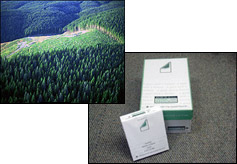Contact Pacific Southwest Waste Program
Pacific Southwest, Region 9
Serving: Arizona, California, Hawaii, Nevada, Pacific Islands, Tribal Nations
Saving Trees One Piece of Paper at a Time

EPA estimates that approximately 44 million tons - or 48% –- of the paper generated in this country ends up in landfills. In an effort to save trees and keep waste out of the landfills, the EPA is working to encourage paper recycling through voluntary partnerships and economic incentives.
Through the Resource Conservation Challenge (now ended), the EPA identifies flexible yet protective ways to conserve natural resources and energy.
For instance, the Recycled Products Cooperative (RPC) ![]() , started through an EPA grant, is a self-sustaining program to encourage paper recycling. The RPC uses group purchasing power to offer quality recycled content paper at competitive prices.
, started through an EPA grant, is a self-sustaining program to encourage paper recycling. The RPC uses group purchasing power to offer quality recycled content paper at competitive prices.
Joining the RPC is free to anyone. Buying small quantities of paper can be expensive – and the bottom line for companies and individuals is often the price. Since RPC buys in bulk, its members can purchase recycled paper at a lower cost that meets – or even beats – regular paper prices.
Through the efforts of the RPC, 500 organizations and more than 120 businesses and universities have started using recycled paper. Between January and June of 2005, the RPC sold 7,527 tons of postconsumer recycled paper.
RPC has led to savings of:
- 60,668 forty-foot tall trees
- 71 Olympic sized swimming pools full of water (17,702,050 gallons)
- 151,329 pounds of carbon dioxide, nitrous oxide and other pollutants
- 10 million kilowatt hours of electricity.
Buying small quantities of paper can be expensive - and the bottom line for companies and individuals is often the price. Since RPC buys in bulk, its members can purchase recycled paper at a lower cost.
Useful Terms:
- Postconsumer recycled paper: Manufactured from material that has been discarded by the consumer. The majority of postconsumer paper is made up of recycled office waste.
- Virgin fiber paper:
Manufactured from trees without the use of any alternative fibers. - Processed chlorine free:
Recycled paper whose content is bleached without chlorine or chlorine derivatives. Paper pulp bleached with chlorine forms toxic compounds (dioxins and furans) that can cause health problems.
RPC partnerships:
- City of San Diego
- Sea World
- UC San Diego
- JFK University
- Harvard University
- Aveda Corporation
- IKEA
- Whole Foods Markets
- Eileen Fisher
For more Information
Recycled Products Purchasing Cooperative ![]()
Resource Conservation Challenge
EPA Contact
Timonie Hood
Office of Pollution Prevention and Solid Waste
United States Environmental Protection Agency
75 Hawthorne Street (WST-7)
San Francisco, California 94105
(415) 972-3282
hood.timonie@epa.gov
